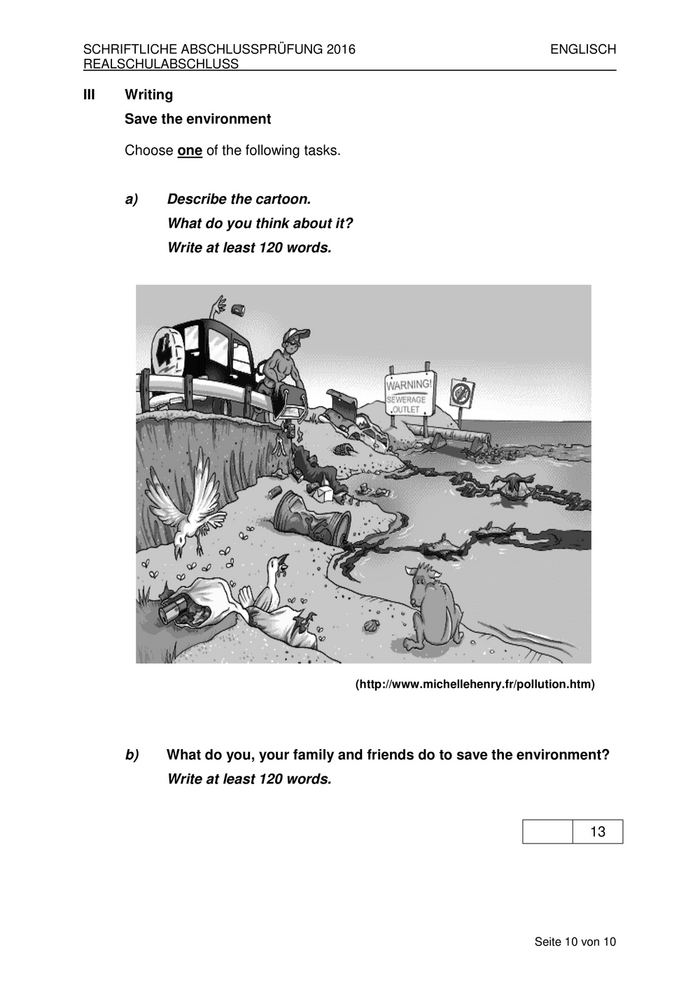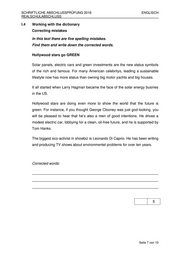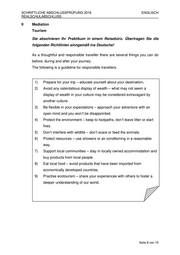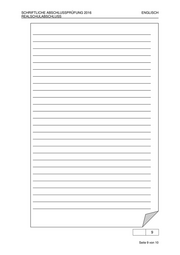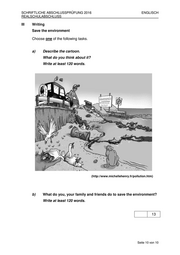rsa16_en_ET_TeilB
Dieses Dokument ist Teil der Anfrage „Realschulabschluss-Aufgaben im Fach Englisch im Jahr 2016 in Sachsen-Anhalt“
Für die Abschlussvorbereitung eignen sich Aufgaben aus den Vorjahren besonders gut. Allerdings weigern sich zahlreiche Bundesländer, die alten Aufgaben zur Verfügung stellen. Sie bleiben Verschlusssache! Einige Bundesländer verkaufen die Aufgaben sogar für kleines Geld an private Verlage, die sich mit dem Verkauf von Vorbereitungsheften eine goldene Nase verdienen.
Mit dieser Ungerechtigkeit muss Schluss sein: Prüfungsvorbereitung darf nicht vom Einkommen abhängig sein. Daher kämpfen wir mit unserer Kampagne „Verschlusssache Prüfung“ für die Veröffentlichung der Klausuren und machen jetzt öffentlichen Druck mit unserer Petition. Jetzt unterschreiben!
Diese Anfrage wurde als Teil der Kampagne „Verschlusssache Prüfung“ gestellt.
SCHRIFTLICHE ABSCHLUSSPRÜFUNG 2016 REALSCHULABSCHLUSS ENGLISCH TEIL B Reading and Use of English, Mediation and Writing Arbeitszeit: 120 Minuten Name, Vorname: Seite 1 von 10

SCHRIFTLICHE ABSCHLUSSPRÜFUNG 2016 ENGLISCH REALSCHULABSCHLUSS I Reading and Use of English Electronic waste: Repair, reuse, recycle … but how? by John Bilstein How many computers, mobile phones and electronic gadgets have you owned over the last ten years? Can you even remember? Probably not! Personally, I’ve gone through at least five mobile phones, three laptops, two television sets, three video recorders, four media receivers, two refrigerators and at least six pairs of 5 headphones since the beginning of 2003. The amount of electronic waste generated worldwide currently runs to about 7kg per person per year, and that figure is going to rise by around 33 per cent over the next five years or so. That doesn’t seem much compared to the billions of tons of household waste 10 produced every year, but electronic equipment isn’t just any old rubbish; it’s full of copper, zinc, chromium, and many other valuable metals. For example, all the mobile phones in Germany put together contain around 2 tons of gold, so they’re worth a lot of money. Unfortunately, some electronic gadgets also contain lots of toxic substances, such as 15 lead and cadmium, and taking them apart can be dangerous. Consumers in the EU and the US pay a small recycling fee whenever they buy a new electronic device; but that’s no guarantee their old hardware will go to a certified recycling firm with high environmental standards. In fact, millions of tons of electronic waste are shipped to the Third World labelled as 20 second-hand equipment. Countries like Ghana and India have hardly any laws protecting the environment, so electrical equipment can be broken up cheaply using primitive methods that are bad for humans, plants and animals. At the Agbogbloshie waste dump in Ghana, for example, copper is removed from old cables by burning up the plastic coating around them, while more valuable metals are 25 often extracted using acid baths. These methods release dioxins and heavy metals into the environment, leaving some waste workers critically ill and killing off trees, fish and other living things. Workers in Agbogbloshie make good money from recycling but many have to vomit every day and some of them die young. Things are just as bad in the Chinese city of Guiyu, where thousands of people are employed in 30 electronic recycling. More than 150 local children have been diagnosed with lead Seite 2 von 10

SCHRIFTLICHE ABSCHLUSSPRÜFUNG 2016 ENGLISCH REALSCHULABSCHLUSS poisoning, with the consequence that many of them will never be able to move or speak properly because of damage to their central nervous system. Another problem often affecting electronic recycling is data theft: some top secret 1 Pentagon files were found at Agbogbloshie, and young computer savvy waste 35 workers will sell on this kind of information to criminals. Just imagine what might happen if your bank forgot to delete your account information before throwing out their old PCs! All these issues make e-waste dangerous. […] But is there a more ecofriendly – and fair – way to do it? (adapted from: Read On, March 2014) I.1 Questions on the text Read the text. Then answer the questions in one to five words or in numbers. 1 Who owned five mobile phones and many other electronic gadgets in the space of ten years? 2 How much electronic waste is produced by a single person in twelve months? 3 Why is it possible that in some countries of the Third World cheap recycling methods are used which are not good for living beings? 1 computer savvy – mit guten Computerkenntnissen Seite 3 von 10

SCHRIFTLICHE ABSCHLUSSPRÜFUNG 2016 ENGLISCH REALSCHULABSCHLUSS 4 Which negative effects on living beings are described in the text? (Name two facts.) 5 Which heavy metal can be a danger to people’s central nervous system? 6 I.2 True/false/not in the text Read the text. Then decide if the statements are true, false or not in the text. Mark the correct box. Statement true false not in the text 1 People produce less domestic waste than electronic waste per year. 2 There is a lot of gold in our mobile phones. 3 People in European countries who buy an electronic gadget pay for the recycling. 4 The EU pays for its additional equipment in the recycling firms. 5 A lot of children in a Chinese city have become ill because of toxic waste. 6 New gadgets will be made in a way that they can be recycled easily. 6 Seite 4 von 10

SCHRIFTLICHE ABSCHLUSSPRÜFUNG 2016 ENGLISCH REALSCHULABSCHLUSS I.3 A closer look at the text a) Translating Translate the following sentences from the text into good German. 1 line 19: In fact, millions of tons of electronic waste are shipped to the Third World labelled as second-hand equipment. 2 line 33: Another problem often affecting electronic recycling is data theft. 2 b) Paraphrasing Which words from the text are paraphrased here? 1 things you throw away because they are no longer useful 2 someone who has committed a crime 3 to remove information stored in a computer 3 Seite 5 von 10

SCHRIFTLICHE ABSCHLUSSPRÜFUNG 2016 ENGLISCH REALSCHULABSCHLUSS c) Finding sentences Copy the sentence from the text that tells you that … 1 some developing countries only have a few laws to protect the environment and electronic devices can be disposed of at low costs and without any regulations which harm the environment. 2 many children have suffered poisoning and life-long damage to their health. 2 Seite 6 von 10

SCHRIFTLICHE ABSCHLUSSPRÜFUNG 2016 ENGLISCH REALSCHULABSCHLUSS I.4 Working with the dictionary Correcting mistakes In this text there are five spelling mistakes. Find them and write down the corrected words. Hollywood stars go GREEN Solar panels, electric cars and green investments are the new status symbols of the rich and famous. For many American celebritys, leading a sustainable lifestyle now has more status than owning big motor yachts and big houses. It all started when Larry Hagman became the face of the solar energy busines in the US. Hollywood stars are doing even more to show the world that the future is green. For instance, if you thought George Clooney was just god-looking, you will be pleased to hear that he’s also a men of good intentions. He drives a modest electric car, lobbying for a clean, oil-free future, and he is supported by Tom Hanks. The biggest eco-activist in showbiz is Leonardo Di Caprio. He has been writing and producing TV shows about environmentel problems for over ten years. Corrected words: 5 Seite 7 von 10

SCHRIFTLICHE ABSCHLUSSPRÜFUNG 2016 ENGLISCH REALSCHULABSCHLUSS II Mediation Tourism Sie absolvieren Ihr Praktikum in einem Reisebüro. Übertragen Sie die folgenden Richtlinien sinngemäß ins Deutsche! As a thoughtful and responsible traveller there are several things you can do before, during and after your journey. The following is a guideline for responsible travellers. 1) Prepare for your trip – educate yourself about your destination. 2) Avoid any ostentatious display of wealth – what may not seem a display of wealth in your culture may be considered extravagant by another culture. 3) Be flexible in your expectations – approach your adventure with an open mind and you won’t be disappointed. 4) Protect the environment – keep to footpaths, don’t leave litter or start fires. 5) Don’t interfere with wildlife – don’t scare or feed the animals. 6) Protect resources – use showers or air conditioning in a reasonable way. 7) Support local communities – stay in locally owned accommodation and buy products from local people. 8) Eat local food – avoid products that have been imported from economically developed countries. 9) Practise ecotourism – share your experiences with others to foster a deeper understanding of our world. Seite 8 von 10
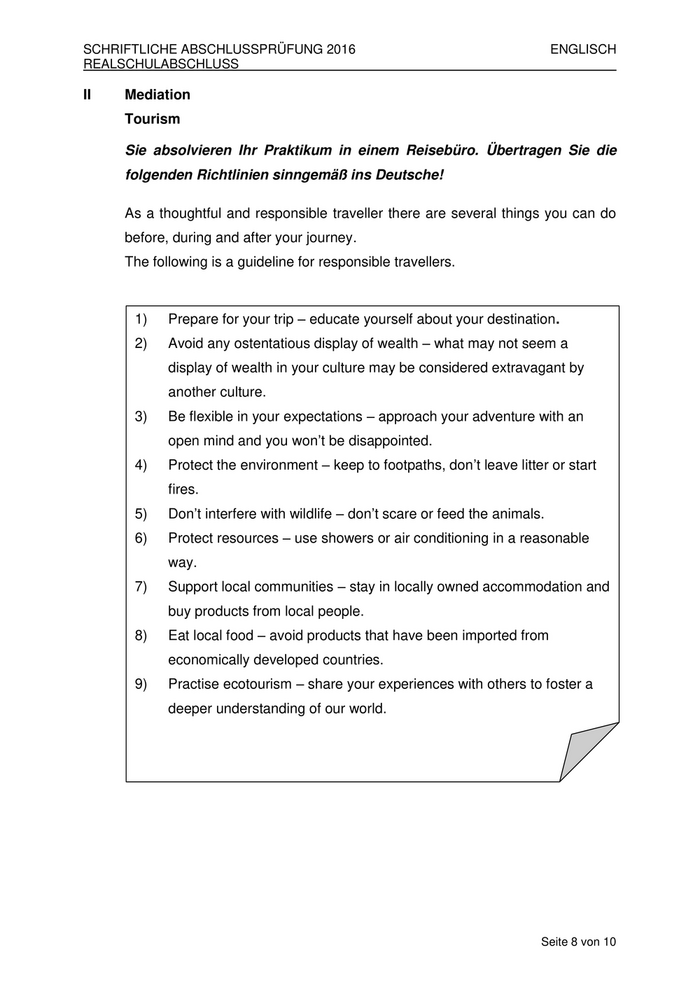
SCHRIFTLICHE ABSCHLUSSPRÜFUNG 2016 ENGLISCH REALSCHULABSCHLUSS 9 Seite 9 von 10
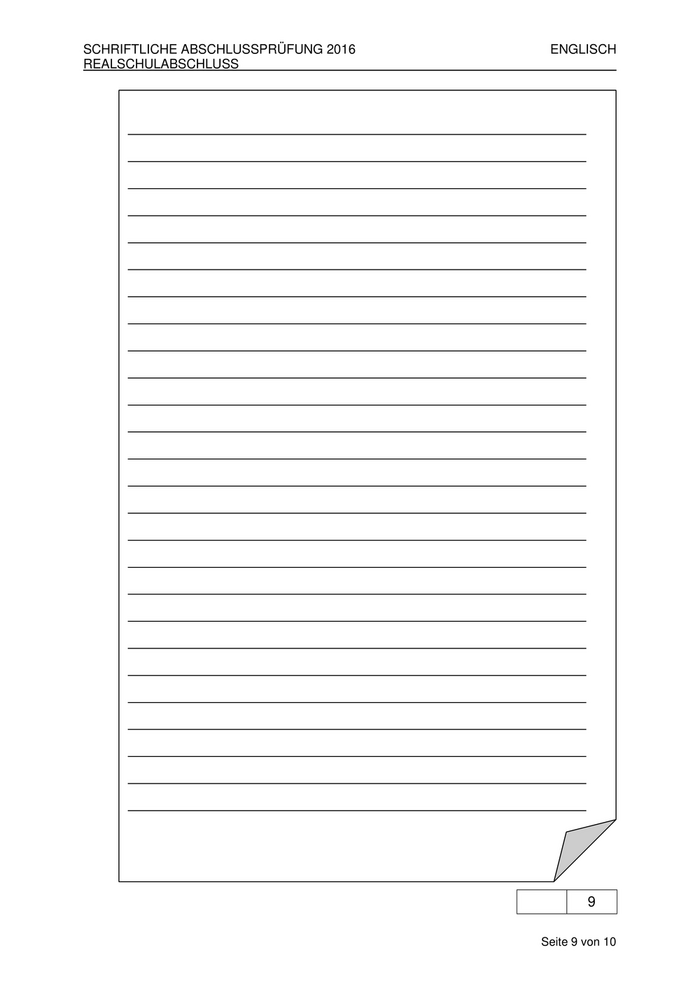
SCHRIFTLICHE ABSCHLUSSPRÜFUNG 2016 ENGLISCH REALSCHULABSCHLUSS III Writing Save the environment Choose one of the following tasks. a) Describe the cartoon. What do you think about it? Write at least 120 words. (http://www.michellehenry.fr/pollution.htm) b) What do you, your family and friends do to save the environment? Write at least 120 words. 13 Seite 10 von 10
